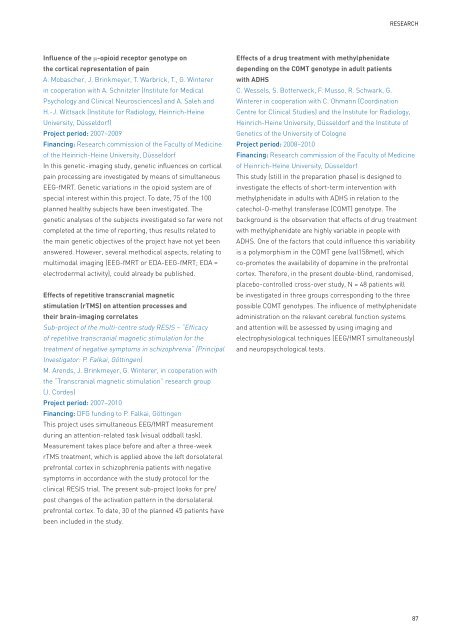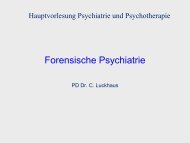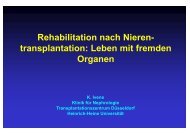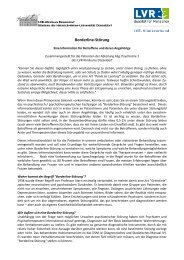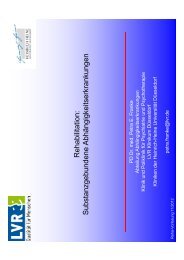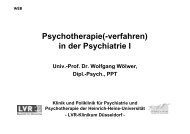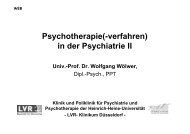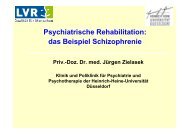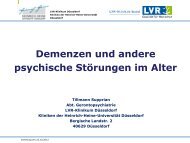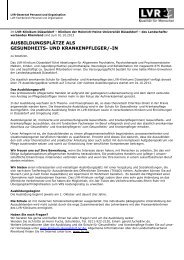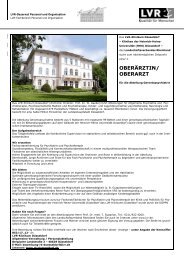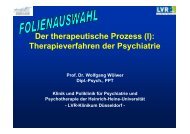LVR-Klinikum Düsseldorf Hospital of the Heinrich-Heine University ...
LVR-Klinikum Düsseldorf Hospital of the Heinrich-Heine University ...
LVR-Klinikum Düsseldorf Hospital of the Heinrich-Heine University ...
Create successful ePaper yourself
Turn your PDF publications into a flip-book with our unique Google optimized e-Paper software.
Influence <strong>of</strong> <strong>the</strong> m-opioid receptor genotype on<br />
<strong>the</strong> cortical representation <strong>of</strong> pain<br />
A. Mobascher, J. Brinkmeyer, T. Warbrick, T., G. Winterer<br />
in cooperation with A. Schnitzler (Institute for Medical<br />
Psychology and Clinical Neurosciences) and A. Saleh and<br />
H.-J. Wittsack (Institute for Radiology, <strong>Heinrich</strong>-<strong>Heine</strong><br />
<strong>University</strong>, <strong>Düsseldorf</strong>)<br />
Project period: 2007–2009<br />
Financing: Research commission <strong>of</strong> <strong>the</strong> Faculty <strong>of</strong> Medicine<br />
<strong>of</strong> <strong>the</strong> <strong>Heinrich</strong>-<strong>Heine</strong> <strong>University</strong>, <strong>Düsseldorf</strong><br />
In this genetic-imaging study, genetic influences on cortical<br />
pain processing are investigated by means <strong>of</strong> simultaneous<br />
EEG-fMRT. Genetic variations in <strong>the</strong> opioid system are <strong>of</strong><br />
special interest within this project. To date, 75 <strong>of</strong> <strong>the</strong> 100<br />
planned healthy subjects have been investigated. The<br />
genetic analyses <strong>of</strong> <strong>the</strong> subjects investigated so far were not<br />
completed at <strong>the</strong> time <strong>of</strong> reporting, thus results related to<br />
<strong>the</strong> main genetic objectives <strong>of</strong> <strong>the</strong> project have not yet been<br />
answered. However, several methodical aspects, relating to<br />
multimodal imaging (EEG-fMRT or EDA-EEG-fMRT; EDA =<br />
electrodermal activity), could already be published.<br />
Effects <strong>of</strong> repetitive transcranial magnetic<br />
stimulation (rTMS) on attention processes and<br />
<strong>the</strong>ir brain-imaging correlates<br />
Sub-project <strong>of</strong> <strong>the</strong> multi-centre study RESIS – “Efficacy<br />
<strong>of</strong> repetitive transcranial magnetic stimulation for <strong>the</strong><br />
treatment <strong>of</strong> negative symptoms in schizophrenia” (Principal<br />
Investigator: P. Falkai, Göttingen)<br />
M. Arends, J. Brinkmeyer, G. Winterer, in cooperation with<br />
<strong>the</strong> “Transcranial magnetic stimulation” research group<br />
(J. Cordes)<br />
Project period: 2007–2010<br />
Financing: DFG funding to P. Falkai, Göttingen<br />
This project uses simultaneous EEG/fMRT measurement<br />
during an attention-related task (visual oddball task).<br />
Measurement takes place before and after a three-week<br />
rTMS treatment, which is applied above <strong>the</strong> left dorsolateral<br />
prefrontal cortex in schizophrenia patients with negative<br />
symptoms in accordance with <strong>the</strong> study protocol for <strong>the</strong><br />
clinical RESIS trial. The present sub-project looks for pre/<br />
post changes <strong>of</strong> <strong>the</strong> activation pattern in <strong>the</strong> dorsolateral<br />
prefrontal cortex. To date, 30 <strong>of</strong> <strong>the</strong> planned 45 patients have<br />
been included in <strong>the</strong> study.<br />
ReseaRch<br />
Effects <strong>of</strong> a drug treatment with methylphenidate<br />
depending on <strong>the</strong> COMT genotype in adult patients<br />
with ADHS<br />
C. Wessels, S. Botterweck, F. Musso, R. Schwark, G.<br />
Winterer in cooperation with C. Ohmann (Coordination<br />
Centre for Clinical Studies) and <strong>the</strong> Institute for Radiology,<br />
<strong>Heinrich</strong>-<strong>Heine</strong> <strong>University</strong>, <strong>Düsseldorf</strong> and <strong>the</strong> Institute <strong>of</strong><br />
Genetics <strong>of</strong> <strong>the</strong> <strong>University</strong> <strong>of</strong> Cologne<br />
Project period: 2008–2010<br />
Financing: Research commission <strong>of</strong> <strong>the</strong> Faculty <strong>of</strong> Medicine<br />
<strong>of</strong> <strong>Heinrich</strong>-<strong>Heine</strong> <strong>University</strong>, <strong>Düsseldorf</strong><br />
This study (still in <strong>the</strong> preparation phase) is designed to<br />
investigate <strong>the</strong> effects <strong>of</strong> short-term intervention with<br />
methylphenidate in adults with ADHS in relation to <strong>the</strong><br />
catechol-O-methyl transferase (COMT) genotype. The<br />
background is <strong>the</strong> observation that effects <strong>of</strong> drug treatment<br />
with methylphenidate are highly variable in people with<br />
ADHS. One <strong>of</strong> <strong>the</strong> factors that could influence this variability<br />
is a polymorphism in <strong>the</strong> COMT gene (val158met), which<br />
co-promotes <strong>the</strong> availability <strong>of</strong> dopamine in <strong>the</strong> prefrontal<br />
cortex. Therefore, in <strong>the</strong> present double-blind, randomised,<br />
placebo-controlled cross-over study, N = 48 patients will<br />
be investigated in three groups corresponding to <strong>the</strong> three<br />
possible COMT genotypes. The influence <strong>of</strong> methylphenidate<br />
administration on <strong>the</strong> relevant cerebral function systems<br />
and attention will be assessed by using imaging and<br />
electrophysiological techniques (EEG/fMRT simultaneously)<br />
and neuropsychological tests.<br />
87


